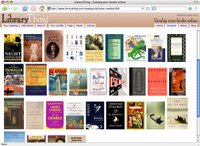As the article points out, many journalists may want to sell their articles on elsewhere, or, as in Ellen's case, may be planning to use them for a book and the reproduction of their work in this way immediately lessens its value.
Freelancers get paid very badly for that appears under their names in the papers (it certainly isn't recompense for the wear and tear on the brain and the amount of ink expended) so they are usually writing for the love of it and with a personal project in view. (For me the journalism is an extension of what I do on this blog, feeding into it and out of it, but of course I have my book projects too.)
My little burst of indignation at the guy who was helping himself to every single one of my blog posts to generate income on his own is recorded in the article, as is my solution :
“I sort of had the last laugh because I stalked him (the thief) back, know where he lives and learned an awful lot about his life!” Sharon says, adding meditatively, “I might put him in a piece of fiction, sad little man.”But yes what can you do? Legally, you don't have much recourse, although the paper today lists some very sensible measures you can take to protect yourself. The ultimate protection is not allowing your work to be put up online, but that would be really very sad. We write because we want people to read us. We want everyone in the whole goddamn world to read us. We just don't want to be ripped off.
Shaming the perps into taking down the material is one recourse, and often the thieves are naive little bloggers too lazy to put up their own content and nourished in an academic environment where plagiarism too often goes undetected and unpunished, and where pirated videos are available on every street corner. These guys at least are easily shamed into taking the post down.
But funnily enough it appears that government departments are among the worst content thieves! Does no-one teach these civil servants about the morality of the cyber-world? Among the baddies that emerge in this piece are Pejabat Majlis Daerah Lenggong* who have lifted material from Jan Stuivenberg's waterfallsofmalaysia and the Perak Veterinary Department who are nicking Ellen's content. You may remember also that Caving Liz was having a long and frustrating battle some time back with an Indian travel agent who stole her stuff to sell package tours to Malaysia on her website.
There is though I think a real need to clarify and tighten laws regarding the use of content, as well as generally raise awareness about the issue, and I hope Ellen's article opens up the discussion about what is and what isn't legitimate use of material.
Meanwhile, if you think that you would like to use something that is on a website or on a blog - ask first! I usually do give permission for others to use my material, but I want to be consulted , and I want to hold on to the right to say no.
(*I wonder if this protest has worked already because the site has suddenly been taken down?)



